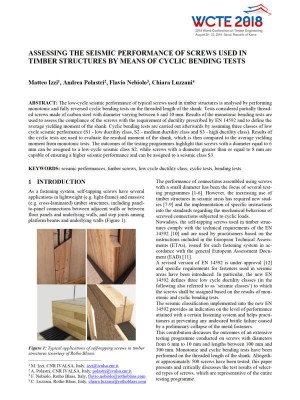
WCTE 2018 - SCREWS
The low-cycle seismic performance of typical screws used in timber structures is analysed by performing monotonic and fully reversed cyclic bending tests on the threaded length of the shank.
Tests considered partially thread-ed screws made of carbon steel with diameter varying between 6 and 10 mm.
Results of the monotonic bending tests are used to assess the compliance of the screws with the requirement of ductility prescribed by EN 14592 and to define the average yielding moment of the shank.
Cyclic bending tests are carried out afterwards by assuming three classes of low cycle seismic performance (S1 - low ductility class, S2 - medium ductility class and S3 - high ductility class).
Results of the cyclic tests are used to evaluate the residual moment of the shank, which is then compared to the average yielding moment from monotonic tests.
The outcomes of the testing programmes highlight that screws with a diameter equal to 6 mm can be assigned to a low-cycle seismic class S2, while screws with a diameter greater than or equal to 8 mm are capable of ensuring a higher seismic performance and can be assigned to a seismic class S3.
| WCTE 2018 - SCREWS |
|---|
